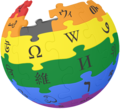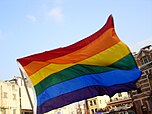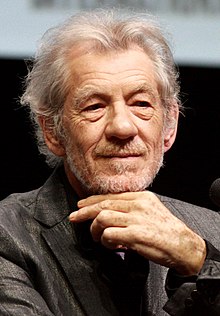Portal:LGBT
| Main page | WikiProjects & Things you can do |

|
The LGBTQ+ Portal |

|

|

|
Introduction LGBT is an initialism that stands for "lesbian, gay, bisexual, and transgender". It may refer to anyone who is non-heterosexual, non-heteroromantic, or non-cisgender, instead of exclusively to people who are lesbian, gay, bisexual, or transgender. A variant, LGBTQ, adds the letter Q for those who identify as queer (which can be synonymous with LGBT) or are questioning their sexual or gender identity. Another variation, LGBTQ+, adds a plus sign "represents those who are part of the community, but for whom LGBTQ does not accurately capture or reflect their identity". Many further variations of the acronym exist, such as LGBT+ (simplified to encompass the Q concept within the plus sign), LGBTQIA+ (adding intersex, asexual, aromantic and agender), and 2SLGBTQ+ (adding two-spirit for a term specific to Indigenous North Americans). The LGBT label is not universally agreed to by everyone that it is generally intended to include. The variations GLBT and GLBTQ rearrange the letters in the acronym. In use since the late 1980s, the initialism, as well as some of its common variants, functions as an umbrella term for marginalized sexualities and gender identities. LGBT is an adaptation of LGB, which in the mid-to-late 1980s began to replace the term gay (or gay and lesbian) in reference to the broader LGBT community. When not inclusive of transgender people, the shorter LGB is still used. (Full article...) Selected article - A lesbian is a homosexual woman or girl. The word is also used for women in relation to their sexual identity or sexual behavior, regardless of sexual orientation, or as an adjective to characterize or associate nouns with female homosexuality or same-sex attraction. The concept of "lesbian" to differentiate women with a shared sexual orientation evolved in the 20th century. Throughout history, women have not had the same freedom or independence as men to pursue homosexual relationships, but neither have they met the same harsh punishment as gay men in some societies. Instead, lesbian relationships have often been regarded as harmless, unless a participant attempts to assert privileges traditionally enjoyed by men. As a result, little in history was documented to give an accurate description of how female homosexuality was expressed. When early sexologists in the late 19th century began to categorize and describe homosexual behavior, hampered by a lack of knowledge about homosexuality or women's sexuality, they distinguished lesbians as women who did not adhere to female gender roles. They classified them as mentally ill—a designation which has been reversed since the late 20th century in the global scientific community. Women in homosexual relationships in Europe and the United States responded to the discrimination and repression either by hiding their personal lives, or accepting the label of outcast and creating a subculture and identity. Following World War II, during a period of social repression when governments actively persecuted homosexuals, women developed networks to socialize with and educate each other. Gaining greater economic and social freedom allowed them to determine how they could form relationships and families. With second-wave feminism and the growth of scholarship in women's history and sexuality in the late 20th century, the definition of lesbian broadened, leading to debate about the term's use. While research by Lisa M. Diamond identified sexual desire as the core component for defining lesbians, some women who engage in same-sex sexual activity may reject not only identifying as lesbians but as bisexual as well. Other women's self-identification as lesbian may not align with their sexual orientation or sexual behavior. Sexual identity is not necessarily the same as one's sexual orientation or sexual behavior, due to various reasons, such as the fear of identifying their sexual orientation in a homophobic setting. (Full article...)Selected biography -Sir Ian Murray McKellen CH CBE (born 25 May 1939) is an English actor. With a career spanning more than sixty years, he is noted for his roles on the screen and stage in genres ranging from Shakespearean dramas and modern theatre to popular fantasy and science fiction. He is regarded as a British cultural icon and was knighted by Queen Elizabeth II in 1991. He has received numerous accolades, including a Tony Award, six Olivier Awards, and a Golden Globe Award as well as nominations for two Academy Awards, five BAFTA Awards and five Emmy Awards. McKellen made his stage debut in 1961 at the Belgrade Theatre as a member of its repertory company, and in 1965 made his first West End appearance. In 1969, he was invited to join the Prospect Theatre Company to play the lead parts in Shakespeare's Richard II and Marlowe's Edward II. In the 1970s McKellen became a stalwart of the Royal Shakespeare Company and the National Theatre of Great Britain. He has earned five Olivier Awards for his roles in Pillars of the Community (1977), The Alchemist (1978), Bent (1979), Wild Honey (1984), and Richard III (1995). McKellen made his Broadway debut in The Promise (1965). He went on to receive the Tony Award for Best Actor in a Play for his role as Antonio Salieri in Amadeus (1980). He was further nominated for Ian McKellen: Acting Shakespeare (1984). He returned to Broadway in Wild Honey (1986), Dance of Death (1990), No Man's Land (2013), and Waiting for Godot (2013), the latter being a joint production with Patrick Stewart. (Full article...)Selected quote -
—Unknown
Current events
Selected image - Tombstone of Leonard Matlovich, discharged from the United States Air Force in the 1970s after coming out as gay.
Did you know… -
This month's birthdays
Selected lists
Related portalsFeatured contentThe following articles and lists have been identified as some of the best produced by the Wikipedia community:
TopicsCategoriesAssociated WikimediaThe following Wikimedia Foundation sister projects provide more on this subject:
Discover Wikipedia using portals |
























